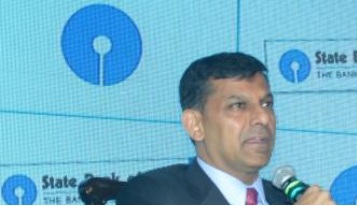 RBI governor Raghuram Rajan has underscored the need for project evaluation and structuring by banks and said issues of HR in banking such as providing higher compensation to top management and its impact on costing have to be seriously addressed. He also suggested that public sector banks should look at ESOPs to help retain talent in public sector banks. Rajan was participating in a tete-a-tete with Arundhati Bhattacharya, chairman of the bank, at the second SBI Banking and Economics Conclave in Mumbai. Finance minister Arun Jaitley inaugurated the conclave, which was organized with the intention of stimulating debate and critical thinking on various topic related to banking industry in India.
RBI governor Raghuram Rajan has underscored the need for project evaluation and structuring by banks and said issues of HR in banking such as providing higher compensation to top management and its impact on costing have to be seriously addressed. He also suggested that public sector banks should look at ESOPs to help retain talent in public sector banks. Rajan was participating in a tete-a-tete with Arundhati Bhattacharya, chairman of the bank, at the second SBI Banking and Economics Conclave in Mumbai. Finance minister Arun Jaitley inaugurated the conclave, which was organized with the intention of stimulating debate and critical thinking on various topic related to banking industry in India.
Dwelling on the recent ‘in-principle’ approvals granted to 11 entities to operate payments banks, he said these banks would not pose any threat to existing banks, maintaining these banks will serve as a feeder to the existing banks. There is nothing the universal banks cannot do that the payments banks can do, he added. With the entry of these banks, banking is going to become more interesting and also rewarding to customers, he said.
Among those participated in the deliberations at the conclave included Baba Kalyani, CMD, Bharat Forge, Kiran M Shaw, chairman and MD, Biocon, Chanda Kochhar, MD and CEO, ICICI Bank, Justice (Retd.) A K Ganguly and Amitabh Kant, secretary, DIPP.
The conclave had panel discussions on four topics: ‘Agenda to Rev up Growth’, ‘Judiciary and Banking – The Missing Link’, ‘Capital Raising for Banks in the Context of BASEL III Norms’ and ‘Current Macroeconomic Challenges beyond CPI and Repo Rate’. In the first discussion, the panelists felt that to rev up growth there is a need to take measures on ease of doing business. Infrastructure spending is imperative to India’s growth and nurturing critical talent, scaling up innovation and use of digital technology will drive growth in sectors, in particular, pharmaceuticals and manufacturing, the panelists felt. In the second panel discussion panelists concluded that there is an urgent need to bring the forefront judicial reform discussion in much greater way than earlier. Adjournments, transparency, accountability and use of IT solutions are some of the key areas where judicial infrastructure needs immediate attention. Panelists at the third discussion were of the view that India needs to tap all sources of capital, be it foreign or domestic. However, some panelists were of the view that BASEL III norms may depress the Return on Equity going forward, which may in turn constrain the future capital raising exercise. The fourth panel discussion covered a numbers of issues like labor productivity, capital intensity of Indian economy, health sector reforms, exchange rates and exports growth. The panelists noted that demographic dividends should be properly used to augment our growth potential.







